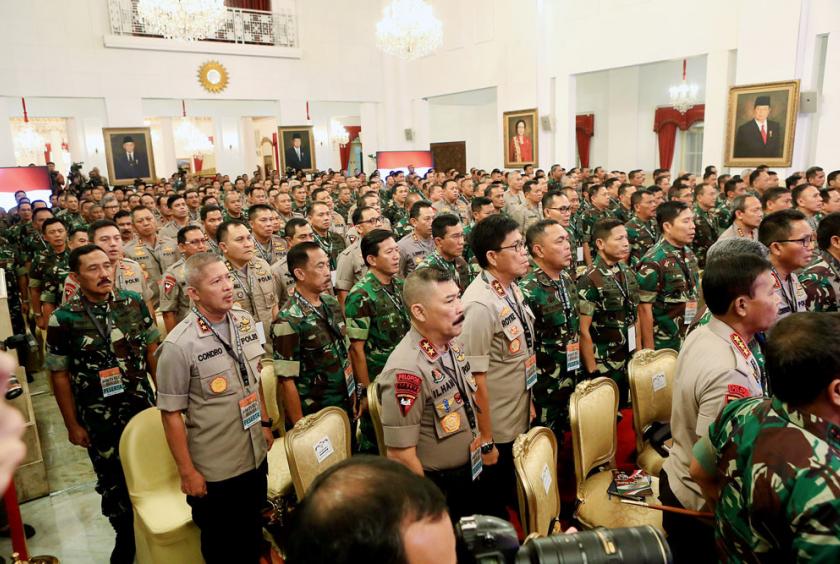
(Jakarta Post/ANN) — Rights watchdog Imparsial has urged the government to continue reforming the Indonesian Military (TNI), including imposing a permanent return to the barracks, amid a plan to allow senior officers to take up posts in various state institutions.
Imparsial has urged the government and the House of Representatives to reconsider the plan, which it has described as a major “setback” for democracy.
“We made efforts to reform our military during the reformation period. This plan will reverse those efforts,” Imparsial executive director Al Araf told reporters on Tuesday, referring to the period from 1998 to 1999 when Indonesia decided to return the military to the barracks.
Previously, TNI commander Air Chief Marshal Hadi Tjahjanto said that hundreds of middle and higher-ranking officers had been idle. To overcome the problem, he said 60 new posts in state institutions such as the National Disaster Mitigation Agency (BNPB) would be provided for brigadiers, majors and lieutenant generals, with some colonels standing a chance of filling the posts through promotion. In addition, officers will have the opportunity to take up positions in the civil service.
Low-ranking soldiers, enlisted personnel and non-commissioned officers will have their service extended by five years to 58.
Al Araf said the TNI’s plans must also include efforts to apply a “zero-growth policy” on personnel to maintain a balance between new recruits and retiring personnel.
Article 53 of the 2004 TNI Law sets the age of retirement for enlisted personnel and non-commissioned officers at 53, while middle to high-ranking officers are eligible for retirement at 58 years.
National Resilience Institute (Lemhannas) governor Agus Widjojo said that idleness indicated a lack of professionalism on the part of the TNI, despite previous reforms that envisioned the TNI as a professional institution. The TNI has asked the President for help because it needs a legitimate solution to its problem.
“Once the President takes over, it is a matter of legitimacy, rather than right or wrong,” the former TNI chief of territorial affairs told The Jakarta Post.
The restructuring plan is based on a 2016 presidential regulation (Perpres) on the organizational structure of the TNI, a revision to the 2010 version that increased the number of personnel in certain positions and created new posts for high-ranking officers in the three branches of the armed service.
Al Araf said the military budget should be dedicated to improving the TNI’s weapons capabilities and personnel welfare rather than recruitment.
“Warfare has changed. Developed countries have focused their budgets on improving their personnel’s capabilities including in cyber security,” he said.
According to the 2016 regulation, for instance, the number of the TNI commanders’ expert staff members will be increased to 10 two-star officers and 17 one-star officers, from the previous 10 and 13, respectively. One of the 10 two-star officers will function as a coordinator of the expert staff.
New positions will also be made in the Navy and Air Force for planning the defense programs of each service. Both posts, assistants to the Navy and Air Force chiefs of staff, will also have deputies.
Agus said the President's plan should not been seen as a setback for TNI reforms because there was no justification in the country’s legislation for reviving the TNI’s New Order-era dual function.
During the Soeharto regime, the military was involved in almost all aspects of civil society, holding positions in the legislature, state companies and other government institutions.
“The TNI’s loyalty to civilian rule remains intact,” he said.
The President's plan, he said, was an unusual solution because the problem had been ignored for so long.
“However, revising the TNI Law to allow active military officers to hold civilian positions and extending the retirement age of low ranking officers will not heal the boil, it will eventually pop open anyway,” Agus said.
He suggested that policymakers must be creative and innovative to develop a long term and sustainable solution.
“One of the fair solutions is early retirement, but it will require incentives to convince active officers to end their military careers,” he said.
https://www.thejakartapost.com/news/2019/02/07/military-restructuring-pl...









